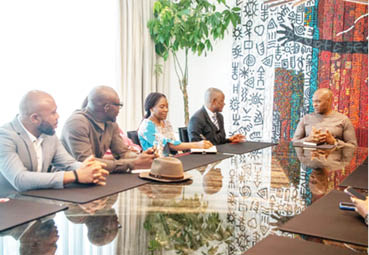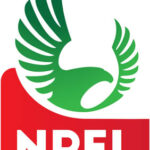The ongoing efforts by the Minister of Sports Development, Senator John Owan Enoh, to woo Nigerian billionaires to own clubs in the Nigeria Professional Football League (NPFL) is no doubt in line with international best practices. In most developed nations, football clubs are mostly owned by influential individuals, corporate organisations or local communities. Government’s major responsibility is the provision of the essential facilities and incentives to engender growth in the sector.
However, the reverse is the case in Nigeria and most African countries where football clubs are mostly owned and funded by the state governments. In the past, notable Nigerians like the late Israel Adebayo (Stationery Stores Lagos), late MKO Abiola (Abiola Babes, Abeokuta), Chief Emmanuel Iwuanyanwu (Iwuanyanwu Nationale), Abdulazeez Mohammed (Ranchers Bees, Kaduna), Gabros Chukwuma (Gabros International), Jude Ezechukwu (Jasper United), Oscar Udoji (Udoji United) and other corporate organisations like Leventis Stores and Julius Berger of Lagos ventured into Nigeria Professional Football League but couldn’t last the distance due to numerous challenges that inhibited their progress.
Despite what may be considered to be the botched dreams of their predecessors, Senator Patrick Ifeanyi Ubah, Pastor Olukoya and Chief Victor Rumson Baribote also made fresh foray into Nigerian football league with FC IfeanyiUbah, MFM Lagos and Nembe City FC, but were left disappointed as they couldn’t survive the harsh terrain.
Therefore, out of the 20 clubs that are competing in the ongoing NPFL season, only three clubs, Remo Stars, Doma United of Gombe and Sporting FC Lagos are privately owned clubs. The rest are owned by the state government and sponsored with public money.
The presence of so many government owned clubs in the Nigerian league is seen as the major reason for the stunted growth of the domestic league. Therefore, when the news emanated on Social Media that one of Nigeria’s billionaires, Tony Elumelu, had hinted that he would in no distant future own a club in the NPFL, it elicited excitement among football stakeholders, especially those who believe that private ownership of clubs is the catalyst for the development of the domestic league.
Interestingly, a few days later, the Minister of Sports, Senator John Enoh, confirmed Elumelu’s interest after their meeting in Lagos. He disclosed further that the Chairman of Heirs Holdings, Transcorp, United Bank for Africa (UBA) is willing to convince his fellow billionaires to come on board.
“My team and I paid him a visit to discuss buying a league club. Not only did he receive us with open arms, but he also made sure to call potential buyers on the spot and extend conversations in this regard. I appreciate his dedication to developing football in Nigeria,” said Enoh.
While some football stakeholders have viewed the fresh move with skepticism, others are full of optimism that it will yield the desired result if properly executed. A former Super Eagles goalkeeper, Etta Egbe, told our correspondent that the presence of Nigerian billionaires will impact positively on the domestic league.
“It will be a very good development to have investors come in to sponsor our football. This is what we have been calling for. Football clubs in Nigeria are not financially strong. So, their coming will motivate our footballers. They will pay their backlog of salaries and look into the problem of facilities,” he said.
The first vice-president of the Nigeria Football Federation, Chief Felix Anyasi-Agwu, said “It is done all over the world looking at Premiership and most owners are billionaires. But you don’t have to be a billionaire to own a football club and slowly our people will come to know and realise that this is a very good area of investment. It is a business that is profitable if well managed but the only problem we have in Nigeria is the foundation.
On his part, a former chairman of the House of Representatives Committee on Sports, Hon. Godfrey Gaiya said “I have always believed that football is a very big business.
“Initially, it will be capital intensive but it will be profitable. So, it is a welcome idea to have our wealthy sons and daughters investing in football by sponsoring teams in the NPFL.
“It will not only improve the standard of the game but also boost the economy. Many of the clubs owned by the states are there for asking and if they see a good investor who will want to key in and allow the club to remain in the state, I don’t see any conflict here.”
The proprietor of the defunct Nemby City FC, Barrister Victor Rumson Baribote, also said bringing in the private sector is a good move as it will improve the standard of the league.
He said “I was once a club owner but we were frustrated by the big guns. So, if the big ones come in and invest, it will be very good for the league.
“State-owned clubs need to see football as business not recreational any longer and if the wealthy private Nigerians invest, the league will grow very well.”
According to Adebowale Oyebode, a business man in Ondo State and founder of Invaders FC, billionaires’ investment into the NPFL would improve the standard of Nigerian football.
“Investments by billionaires in the Nigerian football league can have several positive effects. It will pump much-needed funds into the league, enabling it to improve facilities, training programs, and infrastructure,” said Oyebode who has been sponsoring grassroots football for over 15 years.
Lumumba calls for governments’ disinvestment in clubs
In a related development, a former member of the House of Representatives from Plateau State and proprietor of the defunct Jos City Raiders FC, Hon. Lumumba Dah Adeh, has said the disinvestment of governments in clubs will make the fresh move to succeed.
He said over time, private clubs had been forced into early extinction due to the unhealthy competition with the government owned clubs.
“It is a welcome development but it will only succeed on the condition that state governments disinvest or stop sponsoring clubs. This will put an end to the unhealthy competition between the government and private clubs which hinder the growth of the latter.
“In the past, privately owned clubs like Abiola Babes, Udoji United, Gabros United, Ranchers Bees and of course Jos City Raiders (JC Raiders) which I founded, couldn’t cope with the unfair competition that existed.
“State governments fund clubs for political patronage so most of the clubs indulge in sharp practices like giving bribes to win matches while private club owners can’t afford such.
“I doubt if someone like Elumelu with his hard earned reputation will like to be associated with such unwholesome practices just because he wants to support Nigerian football. Such interest will definitely wane with time.
“So, government ownership of clubs must be stopped or be limited. Since governments own the facilities, they can be given a lower percentage but they shouldn’t be allowed to appoint chairmen and board of the clubs. By the time the private investors develop their own facilities, then the government can disengage completely.
“Like I said earlier, this is a welcome development but if these conditions are not met, the present effort may not yield the desired result,” said Lumumba.

 Join Daily Trust WhatsApp Community For Quick Access To News and Happenings Around You.
Join Daily Trust WhatsApp Community For Quick Access To News and Happenings Around You.


